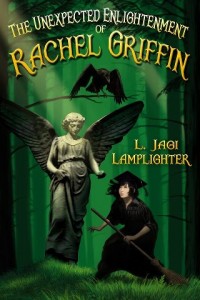The Series Series: The Unexpected Enlightenment of Rachel Griffin by L. Jagi Lamplighter
 Don’t start with the cover, or the blurb, or the elevator pitch. Don’t start with which other books The Unexpected Enlightenment of Rachel Griffin resembles.
Don’t start with the cover, or the blurb, or the elevator pitch. Don’t start with which other books The Unexpected Enlightenment of Rachel Griffin resembles.
To get into the right mood for the story and its intriguing implications, consider Pollepel Island, a ruined fantasy landscape in the Hudson River. Many times I’ve taken the train north from New York City and looked forward to the few minutes’ glimpse of the Bannerman Castle. It’s a story magnet.
L. Jagi Lamplighter is not the first fantasy author to use the island as a setting, but she may be the first one to capture how much it feels like a misplaced island, like a chunk of dream-Scotland lifted by giants from another continent–if not another universe entirely–and deposited randomly in America. Lamplighter’s version of Pollepel Island is an illusion that hides in plain sight the floating island of Roanoke. Yes, the Lost Colony’s Roanoke, navigated around the world by sorcerers who built there a sanctuary and a school.
All roads lead to wizard school. Don’t let it get you down. Lamplighter is doing several unexpected things with the wizard school trope.
 This YA novel’s debt to J.K. Rowling is not a bug, it’s a feature. I worried early on that Rachel Griffin might turn out to be fanfic that got too big for its britches, but it turns out to be a wildly intertextual book that proudly draws on many classics of the YA fantasy canon–probably more of them than I recognized. There are graceful nods to LeGuin’s Earthsea with its wizard academy on Roke where true names shape reality, to Philip Pullman’s use of the many-worlds hypothesis, and to C.S. Lewis’s examination of religion. That last is the trickiest one, I think. How many people do you know who loved The Chronicles of Narnia as children, but who found the heavyhanded allegory problematic when they reread the series as adults?
This YA novel’s debt to J.K. Rowling is not a bug, it’s a feature. I worried early on that Rachel Griffin might turn out to be fanfic that got too big for its britches, but it turns out to be a wildly intertextual book that proudly draws on many classics of the YA fantasy canon–probably more of them than I recognized. There are graceful nods to LeGuin’s Earthsea with its wizard academy on Roke where true names shape reality, to Philip Pullman’s use of the many-worlds hypothesis, and to C.S. Lewis’s examination of religion. That last is the trickiest one, I think. How many people do you know who loved The Chronicles of Narnia as children, but who found the heavyhanded allegory problematic when they reread the series as adults?
 What I especially like about Lamplighter’s turn here is that she has transformed an objection posed by people who wanted to ban the Harry Potter novels–the total absence of religion from the characters’ inner lives–into part of the mystery Rachel Griffin and her friends need to solve. Their world’s history has been deliberately altered, certainly in its records, and possibly in its substance. The magic-using community of the Wise runs on the assumption that they know the true history, which is concealed from the Unwary non-magical folk. Only there are other worlds, with other histories and other laws of nature, and reality is both mutable and permeable. As forces both friendly and destructive infiltrate Rachel’s universe from outside, not only is it unclear to the children in the wizard school what the limits and possibilities of magic are, it’s unclear to every character in every faction.
What I especially like about Lamplighter’s turn here is that she has transformed an objection posed by people who wanted to ban the Harry Potter novels–the total absence of religion from the characters’ inner lives–into part of the mystery Rachel Griffin and her friends need to solve. Their world’s history has been deliberately altered, certainly in its records, and possibly in its substance. The magic-using community of the Wise runs on the assumption that they know the true history, which is concealed from the Unwary non-magical folk. Only there are other worlds, with other histories and other laws of nature, and reality is both mutable and permeable. As forces both friendly and destructive infiltrate Rachel’s universe from outside, not only is it unclear to the children in the wizard school what the limits and possibilities of magic are, it’s unclear to every character in every faction.
 One of the things that makes Rachel a strong enough character to carry the story is that she regards this sudden instability as exciting. She wants to know everything, and at age thirteen she has the innocence to imagine that knowing everything will be a joyful quest, even a joyful attainment. Inevitably she reminds the reader of Hermione Granger from the Harry Potter books, but her personality and approach are vividly different.
One of the things that makes Rachel a strong enough character to carry the story is that she regards this sudden instability as exciting. She wants to know everything, and at age thirteen she has the innocence to imagine that knowing everything will be a joyful quest, even a joyful attainment. Inevitably she reminds the reader of Hermione Granger from the Harry Potter books, but her personality and approach are vividly different.
The main way in which the unavoidable comparisons with Rowling come off less favorably for Lamplighter is in the secondary and tertiary characters. Where Rowling’s cast has a surfeit of individuals with unique histories, agendas, and personalities that are, if anything, too lovingly detailed, Lamplighter’s cast has several characters who are, even after several appearances in a relatively short book, hard to tell apart as personalities. They’re labeled and assigned their functions, but not all of them are revealed the way I like to feel a character has been revealed.
That said, there’s plenty of room in the planned sequels for the supporting cast to develop. There’s plenty of room, too, for the mythic and religious conflicts among the various universes to come to a head. Rachel’s world is a polytheistic one in which the Wise are descendants of gods, fae, and other supernatural beings, but it clearly once had a now-erased strand of monotheism in its history. Lamplighter has handled the cosmological level of the book well enough that I want to see what Rachel Griffin does next to save her world from the raven who is an omen of the death of worlds–but of which worlds, and with what aftereffects?
(Full disclosure: the review copy of this book was given me by the publisher, Dark Quest Books, which will also be publishing one of my books in early 2014. I welcome review copies of first volumes of new fantasy series, from large presses and small, and from self-published authors. I don’t guarantee that I’ll review them all, or that I’ll like them all, but I will make every effort to be fair-minded toward them all.)
Sarah Avery’s short story “The War of the Wheat Berry Year” appeared in the last print issue of Black Gate. A related novella, “The Imlen Bastard,” is slated to appear in BG‘s new online incarnation. Her contemporary fantasy novella collection, Tales from Rugosa Coven, follows the adventures of some very modern Pagans in a supernatural version of New Jersey even weirder than the one you think you know. You can keep up with her at her website, sarahavery.com, and follow her on Twitter.